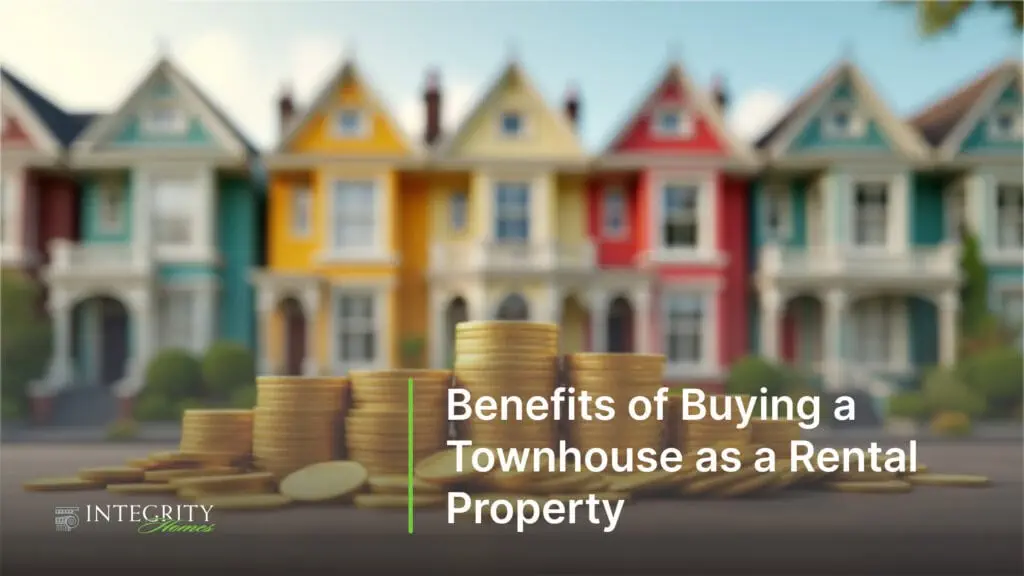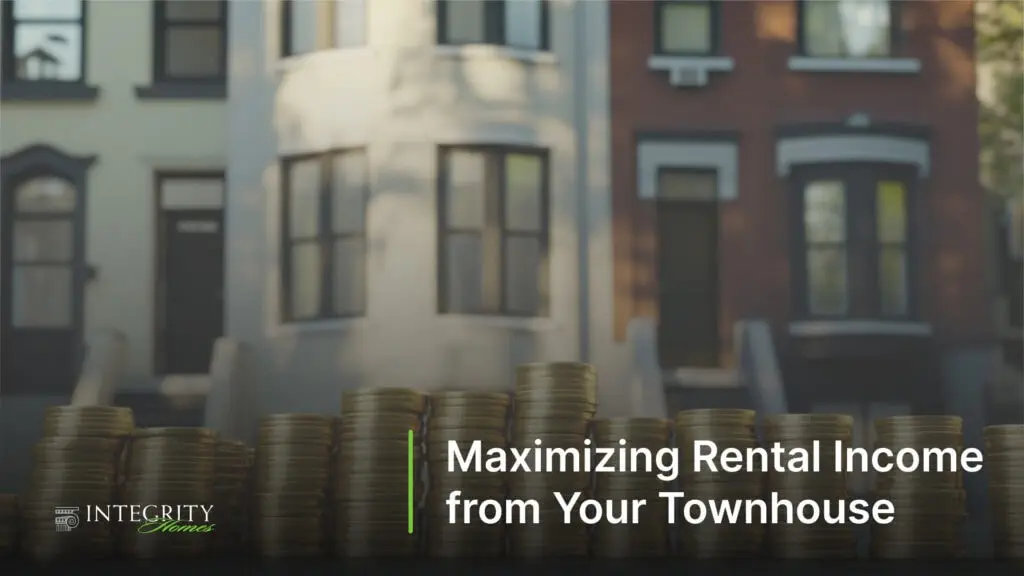
Is buying a townhouse as a rental property a good investment? This guide will explore the benefits, financial considerations, and potential challenges of buying a townhome, to help you decide. By the end, you’ll have a clear understanding of how to make a well-informed investment in a rental townhouse.

A townhouse, a detached home characterized by its multiple floors and shared walls with neighboring houses, typically features a slender layout. These dwellings are usually more economically priced than standalone single-family homes, thereby appealing to both renters looking for affordability and investors in search of lucrative opportunities. In contrast to condominiums, townhouses provide greater seclusion along with the added benefit of outdoor areas which condos often do not offer.
It is essential to understand how these properties stack up against other rental options. Townhouses can be discovered across various architectural styles and locations ranging from bustling city centers to tranquil suburban neighborhoods. This variety opens an array of investment possibilities. Recognizing the distinctive attributes that townhouses carry allows investors to effectively evaluate their viability as income-generating investments within the realm of rental properties.
Investors can benefit from the distinct advantages of both single-family homes and townhouses. Townhouses, in contrast to standalone structures like single-family homes, have shared walls with adjacent units. This often results in greater affordability, thereby facilitating market entry for investors at lower initial costs and widening the pool of potential tenants.
In terms of value appreciation over time, single-family homes usually outperform. They present more challenges when it comes to management as rental properties. Many townhouses fall under homeowners associations (HOAs), which manage maintenance tasks and alleviate some responsibilities typically placed on property owners.
Townhouses frequently enjoy prime locations that might be superior to those available for single family residences. Such desirable placements can enhance the attractiveness of these properties within their respective markets.
In the assessment of townhouses versus condos, it is essential to note that townhouses offer more living space and greater privacy. Unlike condos, which are separate units within a larger complex with restricted outdoor areas, townhouses frequently feature their own entrances and external spaces, providing an atmosphere closer to that of a single family house than a traditional home. This characteristic may be particularly attractive to renters who desire such amenities.
Due to these advantages in terms of added living space and enhanced privacy, investing in townhouses can prove advantageous when aiming to draw tenants who are interested in settling down for extended periods.

Investing in a townhouse as a rental property can provide numerous advantages, making it an outstanding investment option. The potential for robust cash flow from these properties often stems from their lower acquisition costs relative to other types of homes, which may result in more significant investment returns. Townhouses are attractive options for buyers looking into rental properties due to their availability in both urban and suburban locations where demand for budget-friendly housing is high.
The distinctive tall and slender architecture of townhouses typically offers multiple attached living quarters unlike single-family homes, broadening their appeal across various tenant demographics including young professionals and small households. By employing an effective management approach with these properties, investors stand to gain consistent rental income that paves the way to long-term financial prosperity.
The cost-effectiveness of townhouses is a major benefit for investors, as they often come with lower purchase prices than single-family homes. This affordability makes them an appealing investment choice for a broad range of investors looking to acquire rental properties. With the reduced financial barrier to entry into the market, novice and experienced real estate investors can take on less monetary risk while potentially reaping greater returns by choosing townhouses over single-family homes.
Typically, townhouses require less exterior maintenance than single-family homes, offering a considerable advantage for property owners. The responsibility for landscaping, upkeep of shared spaces, and general exterior care frequently falls to homeowners associations (HOAs), alleviating the burden on property owners.
By taking charge of critical tasks such as snow removal and lawn care, HOAs enable landlords to focus their attention on different aspects of their investment. This makes owning townhouses an appealing option with manageable responsibilities for those renting out properties.
The demand for townhouse rentals is notably strong, particularly in suburban areas where families frequently seek out housing. These properties are commonly located in sought-after neighborhoods, enhancing the prospects of swiftly securing tenants. Investors may find that townhouses offer consistent rental revenue, as they appeal to key groups like young professionals and small families searching for living options that balance affordability with comfort.
Townhouses often boast appealing features both in location and design, allowing them to garner competitive rents within the market. This can make such investments financially rewarding over time. Property owners who prioritize keeping their investment properties well-maintained and attractive increase their chances of maximizing rental income by drawing the interest of desirable tenants looking for top-quality rental homes.

When delving into the realm of townhouse investment, it’s vital to grasp the financial obligations and closing costs that come with both acquiring and maintaining such a property. Informed decision-making and maximized profits hinge on an investor’s comprehension of pivotal monetary elements like HOA fees, required down payments, as well as potential tax advantages.
To steer their investments towards success, landlords can employ expert property managers coupled with market analysis instruments for devising sound pricing approaches. Monitoring trends within the local real estate scene and discerning economic determinants impacting property values are imperative practices for triumph in real estate investing involving townhouses.
Investors considering a townhouse for their initial rental property investment typically need to make a down payment ranging from 15% to 20%. Various financing alternatives are available, such as buying with cash or taking out a mortgage. For acquiring rental properties, non-owner-occupied loans are frequently the preferred method of financing.
Grasping the different financial routes available is crucial in aiding investors to select an option that aligns with their economic circumstances and objectives for investing.
HOA fees are an important consideration when investing in townhouses. These fees can affect loan qualification by reducing borrowing capacity. Additionally, HOA fees for townhouses are usually higher than those for single-family homes, which can impact the overall profitability of the investment. Investors should carefully review the HOA’s financial health and any potential for special assessments, which can arise from major repairs or financial difficulties within the HOA, significantly affecting profits.
Special assessments can disappear profits if not accounted for, so it’s essential to understand the HOA’s history and potential future costs. Thorough research and asking the right questions can help investors mitigate the risks associated with HOA fees and special assessments.
The investment in townhouse properties can be financially advantageous due to the tax incentives offered, such as employing depreciation schedules. This method of accounting enables landlords to apportion the cost of their property across its lifespan, diminishing taxable income and thus potentially decreasing taxes owed.
Grasping these tax advantages can heighten the appeal of investing in townhouses. Working alongside a proficient tax consultant or accountant helps investors fully exploit available deductions, thereby enhancing the financial outcomes from their rental properties.

It is critical to choose the appropriate townhouse when aiming to optimize rental income and avoid unnecessary complications. Investors ought to seek out properties with features that are desirable to renters, evaluate the state of the property carefully, and be aware of any concealed expenses that may arise. Employing a real estate agent can assist in securing an advantageous purchase price, handling documentation efficiently, and offering referrals for professional inspectors, all contributing factors towards a more seamless acquisition process.
Undertaking extensive research on neighborhood dynamics is imperative for gaining insight into local conveniences, educational institutions, and its general attractiveness. A comprehensive examination of the townhouse will reveal if there are repair needs so as not to delay making it available for rent—helping ensure it meets expectations for attracting tenants swiftly.
Location plays a vital role in the success of a townhouse or investment property. Solid rental demand is often observed in busy areas, making townhouses a desirable investment. Proximity to work, schools, and local amenities significantly influences tenant appeal and rental success.
Key criteria for searching townhouse markets include rental strategy, school rankings, property price, and occupancy rates. Checking for desirable amenities such as parking spaces, yards, and shared facilities can boost tenant attractiveness.
Before leasing out their properties, landlords should familiarize themselves with the homeowners association’s rules and regulations to avoid disputes. It is critical for property owners to communicate effectively and follow these guidelines as HOAs can impose stringent policies that might clash with a landlord’s preferred way of managing.
When considering purchasing a townhouse, it is crucial for potential buyers to review the homeowner association’s governing documents regarding rental limitations. Verifying if renting is permitted by the HOA, along with understanding any specific restrictions on such arrangements, must be done before making an investment decision first rental property.
Before investing in a townhouse, it is crucial to conduct an exhaustive assessment to reveal any concealed issues. Discovering repair needs at the stage of inspection can greatly influence both the investment outlay and how quickly the property can be prepared for renting.
Emphasizing a property inspection enables purchasers to avoid unforeseen costs, bolstering their chances of securing a lucrative return from their investment within the rental market.

To optimize the rental income from a townhouse, it’s essential to adopt an effective strategy. This involves setting competitive rates while ensuring your property is appealing enough to draw in desirable tenants. By upgrading the property and offering attractive amenities, you can increase its appeal to prospective renters.
Enlisting the services of a professional property manager helps simplify day-to-day management by tackling tenant issues and overseeing maintenance tasks efficiently. This enables landlords to concentrate on other aspects of their investment properties. By employing these methods, investors are positioned to enhance their returns from sought-after rental properties effectively.
Landlords who delve into the local rental market can discern elevated average rent prices coupled with reduced vacancy rates. Grasping a community’s rental figures is vital to comprehend standard rental costs and vacancies, thereby equipping landlords with the knowledge required for prudent decision-making.
In establishing rents, it is important for landlords to account for factors such as the typical rent amount in the area, customary room counts like bedrooms and bathrooms, and rival offerings nearby. Both occupancy gaps and competitive pricing impact how attractive their properties are within the market—this directly bears upon potential earnings from monthly rental income.
Modernizing the interior of a property with contemporary fittings and visually appealing features can greatly appeal to prospective tenants. Properties that offer sought-after amenities, including parking spaces and security measures, are able to command increased rental prices. Improving a property’s curb appeal with attractive landscaping also raises its allure for potential renters.
By making improvements that heighten the attractiveness of properties to tenants, landlords can achieve greater occupancy rates and boost their rental income.
Efficient management of rental properties is essential for maintaining their profitability and smooth operation. Landlords can greatly reduce their workload by engaging homeowners associations (HOAs), which take care of the exterior maintenance, among other tasks. Employing a property manager relieves landlords from the everyday hassles that come with tenant relations, offering a layer of protection while swiftly addressing tenant concerns and upkeep issues. This arrangement enables landlords to reap passive income without being heavily involved on a daily basis.
Adopting such property management tactics ensures that an investment in a townhouse remains attractive and well-kept as a rental option, thereby optimizing rental income potential and ensuring consistent returns on investment.

Investing in townhouses comes with numerous advantages, yet it is crucial to acknowledge the possible difficulties and hazards involved. Issues arising from tenants can adversely affect both rental income and the maintenance of the property. To promote prompt payment of rent and safeguard landlords against monetary setbacks, incorporating explicit policies regarding late fees into lease contracts is recommended.
Engaging a property manager could relieve some of the burdens associated with tenant interactions and upkeep tasks, as they bring specialized knowledge for dealing with challenging tenant scenarios. By comprehending and making provisions for these potential obstacles, investors are better equipped to diminish risks and enhance their experience managing rentals.

Fluctuations in the market and the appreciation of property values can have a profound effect on the value of townhouse investments. Factors such as demographic shifts, economic climates, variations in interest rates, and governmental regulations all play roles in determining real estate prices. To these factors, inflation may drive up property costs because it increases construction expenses, potentially restricting the availability of new housing.
Grasping these dynamics within the market is vital for those involved in real estate investing. By keeping abreast with trends affecting both the housing market and broader economy, a real estate investor can make more informed decisions that contribute towards sustainable success over time.
Landlords often face the difficulty of managing challenging tenants, who may cause conflicts within townhouse complexes and create problems for both property owners and other residents. Establishing a concise lease agreement is crucial in averting misinterpretations and outlining clear expectations for all parties involved.
Securing landlord insurance offers monetary safeguards against possible predicaments that stem from tenant-related complications, including damage to the property or failure to pay rent. Proactive preparation coupled with adept management practices are essential tools for landlords in reducing the adverse effects troublesome tenants can have on their rental properties.
In communities of townhouses, the administrative role often falls under homeowners associations (HOAs), which are responsible for upkeep and offering various facilities. This arrangement can lessen the burden on landlords regarding property maintenance duties. It’s important to note that HOA fees might have a profound effect on your investment’s cash flow and should be factored into your strategic planning as they could introduce additional expenses through mortgage payments or special assessments.
Before committing to such an investment, it’s imperative to diligently examine the rules and bylaws set forth by HOAs since there might be specific limitations in place regarding rental properties and their oversight – oversights here can lead to potential disputes. Being aware of risks tied with HOAs, including unanticipated amendments or escalations in charges, is beneficial for landlords seeking ways to counteract possible conflicts proactively, aiming for a more stable trajectory in their real estate investments.
Investing in rental properties, particularly townhouses, can yield numerous advantages. They tend to be more affordable, entail lower upkeep requirements and benefit from robust demand for rentals. When investors understand how townhouses differ from other types of properties, they are better equipped to maximize their investment returns by carefully considering crucial financial factors including initial down payments, HOA fees that come with such investments and the tax benefits involved.
To ensure the selection of an ideal townhouse as a rental property, it’s essential to engage in comprehensive research which includes fully grasping the regulations set forth by homeowners’ associations (HOAs) along with conducting thorough inspections of potential properties. To optimize rental income from these properties, maintaining competitive rates is necessary alongside increasing the desirability for tenants and managing the property effectively. Preparedness is key. Facing occasional challenges like market volatility or difficulties with tenants or even disputes related to HOAs becomes part of a successful investment journey.
By adhering to vital advice and tactics pertinent to this field smart investment, investors have everything required at hand not just for stepping into but also thriving within the realm of townhouse investments reaping considerable economic gains through profitable rental ventures.
The main difference is that townhouses are usually more affordable and share walls, whereas single-family homes stand alone and often have fewer exterior walls and better appreciation potential.
Choose the option that best fits your lifestyle and financial goals!
Townhouses are a low-maintenance investment because homeowners’ associations (HOAs) manage exterior upkeep and landscaping, freeing homeowners associations and you from those responsibilities.
Embrace the ease of ownership and enjoy your time without the hassle!
It’s essential to incorporate HOA fees into your investment plan, as they can have a substantial impact on both cash flow and your ability to borrow.
Stay vigilant about the possibility of special assessments in order to prevent unforeseen costs that might disrupt your financial objectives!
You have exciting financing options for buying a townhouse as a rental property! Consider cash purchases, traditional mortgages, or non-owner-occupied loans, usually requiring a down payment of 15-20%.
To maximize your rental income, set competitive prices and enhance your property’s appeal with upgrades or staging.
Consider hiring a property manager for streamlined operations and increased occupancy.
Maryland | Frederick, MD | National Harbor, MD | Potomac, MD
Virginia | Alexandria, VA | Fairfax, VA | Lorton, VA | Northern, VA | Stafford, VA | Stephenson, VA | Winchester, VA | Washington DC